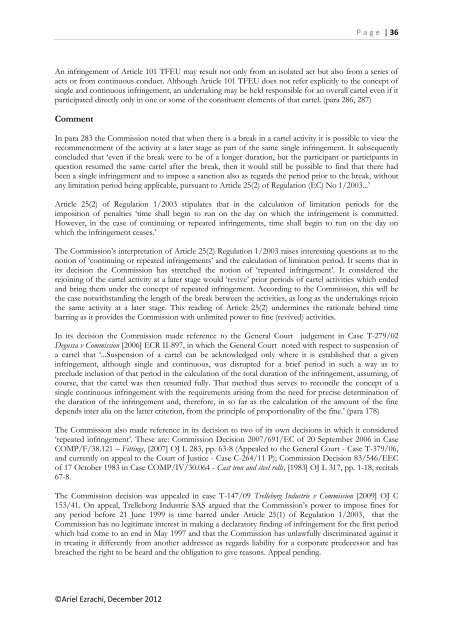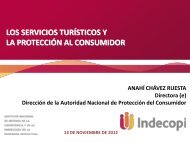EU Competition Law and Policy - compal
EU Competition Law and Policy - compal
EU Competition Law and Policy - compal
You also want an ePaper? Increase the reach of your titles
YUMPU automatically turns print PDFs into web optimized ePapers that Google loves.
©Ariel Ezrachi, December 2012<br />
P a g e | 36<br />
An infringement of Article 101 TF<strong>EU</strong> may result not only from an isolated act but also from a series of<br />
acts or from continuous conduct. Although Article 101 TF<strong>EU</strong> does not refer explicitly to the concept of<br />
single <strong>and</strong> continuous infringement, an undertaking may be held responsible for an overall cartel even if it<br />
participated directly only in one or some of the constituent elements of that cartel. (para 286, 287)<br />
Comment<br />
In para 283 the Commission noted that when there is a break in a cartel activity it is possible to view the<br />
recommencement of the activity at a later stage as part of the same single infringement. It subsequently<br />
concluded that ‘even if the break were to be of a longer duration, but the participant or participants in<br />
question resumed the same cartel after the break, then it would still be possible to find that there had<br />
been a single infringement <strong>and</strong> to impose a sanction also as regards the period prior to the break, without<br />
any limitation period being applicable, pursuant to Article 25(2) of Regulation (EC) No 1/2003...’<br />
Article 25(2) of Regulation 1/2003 stipulates that in the calculation of limitation periods for the<br />
imposition of penalties ‘time shall begin to run on the day on which the infringement is committed.<br />
However, in the case of continuing or repeated infringements, time shall begin to run on the day on<br />
which the infringement ceases.’<br />
The Commission’s interpretation of Article 25(2) Regulation 1/2003 raises interesting questions as to the<br />
notion of ‘continuing or repeated infringements’ <strong>and</strong> the calculation of limitation period. It seems that in<br />
its decision the Commission has stretched the notion of ‘repeated infringement’. It considered the<br />
rejoining of the cartel activity at a later stage would ‘revive’ prior periods of cartel activities which ended<br />
<strong>and</strong> bring them under the concept of repeated infringement. According to the Commission, this will be<br />
the case notwithst<strong>and</strong>ing the length of the break between the activities, as long as the undertakings rejoin<br />
the same activity at a later stage. This reading of Article 25(2) undermines the rationale behind time<br />
barring as it provides the Commission with unlimited power to fine (revived) activities.<br />
In its decision the Commission made reference to the General Court judgement in Case T-279/02<br />
Degussa v Commission [2006] ECR II-897, in which the General Court noted with respect to suspension of<br />
a cartel that ‘...Suspension of a cartel can be acknowledged only where it is established that a given<br />
infringement, although single <strong>and</strong> continuous, was disrupted for a brief period in such a way as to<br />
preclude inclusion of that period in the calculation of the total duration of the infringement, assuming, of<br />
course, that the cartel was then resumed fully. That method thus serves to reconcile the concept of a<br />
single continuous infringement with the requirements arising from the need for precise determination of<br />
the duration of the infringement <strong>and</strong>, therefore, in so far as the calculation of the amount of the fine<br />
depends inter alia on the latter criterion, from the principle of proportionality of the fine.’ (para 178)<br />
The Commission also made reference in its decision to two of its own decisions in which it considered<br />
‘repeated infringement’. These are: Commission Decision 2007/691/EC of 20 September 2006 in Case<br />
COMP/F/38.121 – Fittings, [2007] OJ L 283, pp. 63-8 (Appealed to the General Court - Case T-379/06,<br />
<strong>and</strong> currently on appeal to the Court of Justice - Case C-264/11 P); Commission Decision 83/546/EEC<br />
of 17 October 1983 in Case COMP/IV/30.064 - Cast iron <strong>and</strong> steel rolls, [1983] OJ L 317, pp. 1-18, recitals<br />
67-8.<br />
The Commission decision was appealed in case T-147/09 Trelleborg Industrie v Commission [2009] OJ C<br />
153/41. On appeal, Trelleborg Industrie SAS argued that the Commission’s power to impose fines for<br />
any period before 21 June 1999 is time barred under Article 25(1) of Regulation 1/2003, that the<br />
Commission has no legitimate interest in making a declaratory finding of infringement for the first period<br />
which had come to an end in May 1997 <strong>and</strong> that the Commission has unlawfully discriminated against it<br />
in treating it differently from another addressee as regards liability for a corporate predecessor <strong>and</strong> has<br />
breached the right to be heard <strong>and</strong> the obligation to give reasons. Appeal pending.



